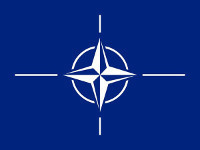NATO prepares for 'conventional war'
NATO is planning to hold large-scale military exercises in Europe to brush up its skills of conventional warfare. The generals of the military bloc insist that this is not an exercise in reflecting of a hypothetical Russian military threat. Participation of the military alliance in the Syrian conflict on the side of its party, Turkey, is much more likely.

Military exercise "Steadfast Jazz" is scheduled to be held in Latvia and Poland on November 2 - 9 with the participation of 6,000 troops from 20 allied armies, according to a press release from NATO. Military experts argue that these will be the largest military maneuvers since 2006.
NATO's military commander, U.S. Air Force Gen. Philip Breedlove said at a press conference in the Netherlands on Wednesday: "For the past 10 to 12 years we have become incredibly proficient at the counter-insurgency mission that we have been fighting in Afghanistan." The general spoke about the need to brush up on the skills of conventional warfare and readiness for more complex tactical schemes. He added that it was about the expulsion of invaders from the territory of allied countries.
Of course, he was immediately asked whether Russia was seen as a potential invader. Breedlove denied this and said that Russian observers were invited to the exercise. In addition, the general said that NATO and Russian military forces will conduct joint exercises at the end of this month and will practice an operation on monitoring and responding to a seizure of an aircraft by terrorists.
The Alliance also plans to conduct joint exercises with Russia in search and rescue of submarines in 2014. This is not convincing because the scale of such exercises is not comparable with the exercises practicing a reflection of a potential large-scale aggression.
The NATO press release states that the exercise "Steadfast Jazz" will test NATO rapid response force for air, land and sea, as well as Special Forces. Shooting exercises and a phased reflection of cyber-attacks training will be held, said the French Major-General Michel Yakovleff, deputy chief of staff of NATO. Who is capable of such an attack? Russia. So, after all, are we talking about a Russian threat? The threat is constantly discussed in the West by bringing up the memories of the "short war in 2008" led by the Russian Federation in support "of the two breakaway regions of Georgia," wrote a columnist of Reuters.
He also said that Europe and Russia were competing for influence in Eastern Europe, for example, Ukraine that will send commando units to take part in the NATO exercises. In an interview with Iran's Press TV American political commentator Gordon Duff said that Israel was pushing the U.S. towards a direct military confrontation with Russia over Syria. Duff also warned that if the Obama administration really takes part in a war against Syria, the war would last for over ten years.
Earlier Breedlove said that the combined forces of NATO in Europe were facing hard times because the U.S. and its allies, following the policy of "belt-tightening," significantly reduced their military budgets. This forced the alliance to begin reforms to provide a wide range of military cooperation. This has to do with the division of functions between the allies. Something has already been done, for example, the air space of Estonia, Lithuania and Latvia is already being patrolled by the German Air Force, and the Germans shifted control of their military air transportation to a single NATO headquarters in Eindhoven. In the future it is planned to create the same type of uniform control system of missile defense in the European territory, as well as the system of military intelligence using unmanned aerial vehicles centered in Italy.
Of course, this concept should be ensured by a high level of integration of the NATO armies. The need to test the combat readiness in more intimate potential threats, such as early intervention in Syria, is growing. Despite the agreement on the destruction of the Syrian chemical arsenal, this probability is very high. NATO Secretary General Anders Fogh Rasmussen said on Thursday at an event organized by the think tank Carnegie Europe that regardless of the outcome of the discussions in the Security Council, the military option was still on the table.
The U.S. and its allies have the opportunity to act directly, through a member of the alliance Turkey that is now trying to provoke a "reciprocal aggression." Earlier this week, Turkish air defenses shot down a Syrian military helicopter, and a bomb exploded on the Syrian-Turkish border.
The fact that such a plan was ready was announced in the spring by the former commander of NATO forces in Europe, Admiral James Stavridis. He said that the alliance in principle was ready to repeat in Syria the same sequence as was earlier implemented in Libya. Operation plans have already been prepared, and the troops were ready. He emphasized the deployment of Patriot air defense system in Turkey by the alliance. He said that he thought that when your aircraft is shot down, the desire to continue the bombardment is significantly reduced. He added that it was technically possible to clear the north of Syria with warplanes stationed in Turkey.
Lyuba Lulko
Pravda.Ru
Subscribe to Pravda.Ru Telegram channel, Facebook, RSS!


